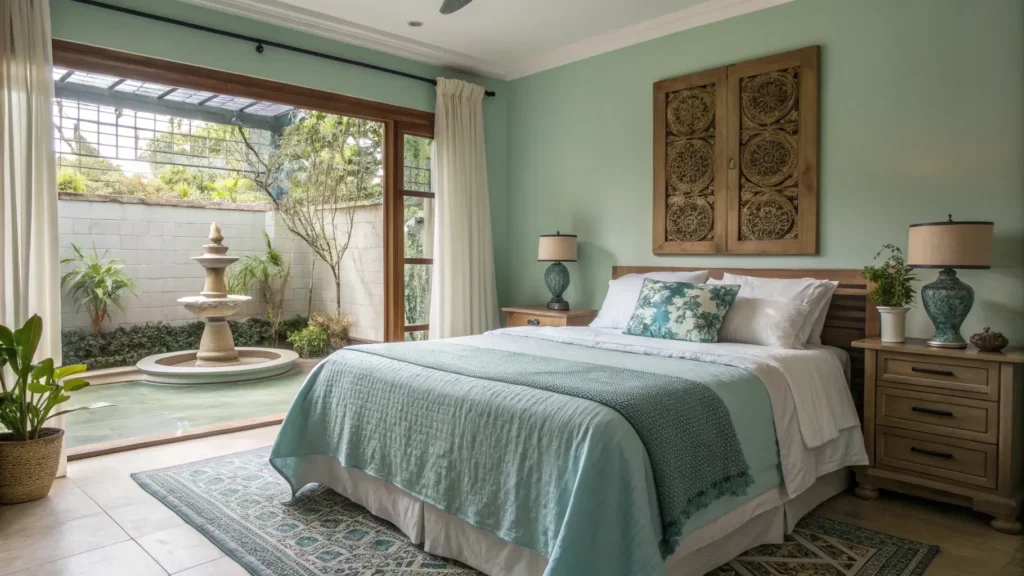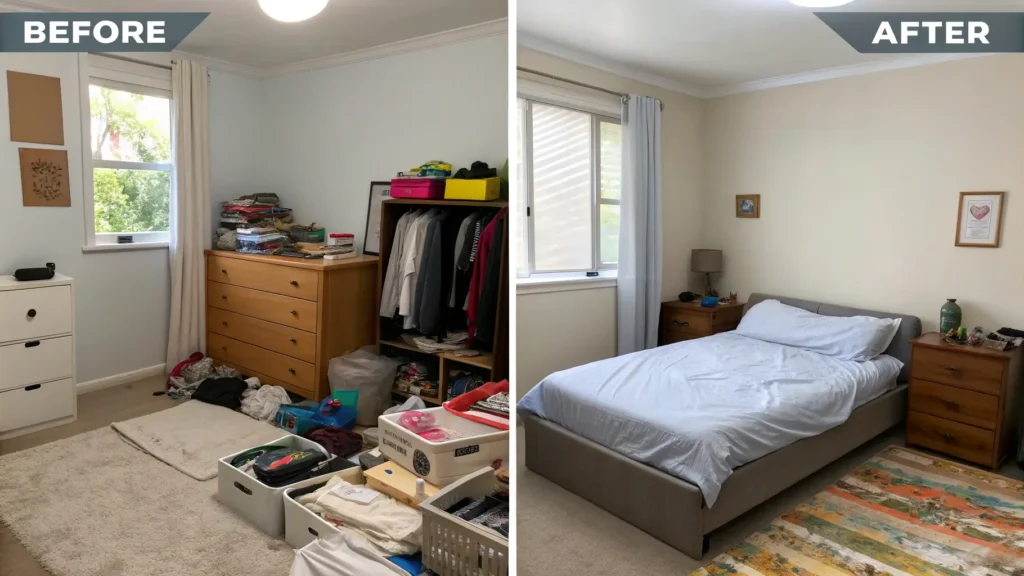Are you tossing and turning at night, feeling drained, or struggling with relationship harmony? The solution might be simpler than you think: your Feng Shui bed position. This ancient Chinese art of placement, particularly in the bedroom, profoundly influences your well-being, energy levels, and even your personal relationships. This comprehensive guide will unlock the secrets to optimizing your bedroom’s energetic potential, transforming your sleep, inviting love, and fostering abundance. You’ll gain actionable strategies, discover advanced principles, and find expert solutions for even the most challenging room layouts, ensuring your bed becomes a true sanctuary.
TABLE OF CONTENTS
Unlock Your Bedroom’s Energetic Potential
Imagine waking up every day feeling refreshed, vibrant, and ready to embrace the world. For centuries, the principles of Feng Shui have been used to create harmonious living spaces, with the bedroom and specifically your Feng Shui bed position being paramount. It’s where you rest, rejuvenate, and are most vulnerable, making its energetic alignment critical to your health, mood, and relationships. Research consistently shows that a well-arranged sleep environment significantly impacts sleep quality and overall mood. SleepFoundation.org
By the end of this guide, you’ll not only understand the fundamental rules but also master advanced techniques to perfectly position your bed, turning your bedroom into a powerful energetic anchor for a more balanced and fulfilling life.

The Golden Rule: Mastering the Commanding Position
At the heart of optimal Feng Shui bed position lies the concept of the “Commanding Position.” This isn’t just a rule; it’s a foundational principle designed to give you a sense of security, support, and control over your life. When your bed is in the commanding position, you feel safe, powerful, and better able to navigate daily challenges.
The Commanding Position means your bed should be placed diagonally opposite the bedroom door, allowing you to see anyone entering without being directly in line with the door. Your headboard should be against a solid wall, providing strong symbolic support. Avoid placing the bed directly in line with the door, as this is known as the “coffin position” and can lead to a feeling of vulnerability or drain on your energy. This setup ensures you are energetically “in command” of your space.
Essential Feng Shui Rules for Bed Placement
Beyond the commanding position, several core principles guide an ideal Feng Shui bed position. These “do’s and don’ts” are vital for fostering a serene, supportive, and energetically balanced sleep environment.
Against a Solid Wall: The Power of Support
Placing your bed’s headboard against a solid, interior wall is crucial for providing a sense of stability, security, and energetic backing. This solid support translates into feeling more secure and grounded in your life. Avoid placing your bed against a shared wall with a bathroom, laundry room, or kitchen, as these areas carry active, often chaotic, energy that can disturb your rest.
Quick Fix Tip: If your bed cannot be against a solid wall, a sturdy, solid headboard can offer some symbolic support. Alternatively, a heavy screen or solid bookshelf placed directly behind the headboard can mimic the stability of a wall.
Avoiding Direct Line with the Door: Protecting Your Energy
As mentioned, the “coffin position” – where your bed is directly aligned with the bedroom door – is energetically draining. It puts you in a vulnerable state, making you feel constantly exposed or energetically “attacked.” While you should have a clear view of the door, your feet or head should not point directly towards it. This allows you to perceive incoming energy without being overwhelmed by it.
No Bed Under a Window: Stability and Energy Loss
Placing your bed directly under a window can lead to a feeling of instability and a loss of personal energy. Windows are openings to the outside world, and their energetic flow can be disruptive to restful sleep. It creates a lack of solid support behind your head, making you feel less secure.
If placing your bed under a window is unavoidable, remedial measures can help. Use heavy, blackout curtains that can be closed at night to create a solid visual and energetic barrier. A tall, solid headboard can also provide a sense of symbolic protection and support.
Mirrors in the Bedroom: Reflecting & Amplifying Energy
Mirrors are powerful amplifiers and reflectors of energy in Feng Shui. While they can expand a space, their placement in the bedroom requires careful consideration. A mirror reflecting the bed is generally discouraged, as it can disrupt sleep, invite third-party interference in relationships, and amplify anxieties.
Mirror Placement Checklist:
- DO NOT reflect the bed.
- DO NOT reflect the door.
- DO place them on a wall where they reflect something beautiful or expansive, not clutter.
- CONSIDER covering them at night if removal isn’t an option.
Managing Electronics & Clutter: Clear Space, Clear Mind
Electronics, especially those emitting electromagnetic fields (EMFs) like TVs, computers, and even excessive charging phones, can disrupt the calm energy required for restful sleep. Clutter, on the other hand, creates stagnant energy, making your space feel heavy and your mind restless. A clear, serene environment promotes optimal Qi (life force energy) flow, supporting your Feng Shui bed position.
5-Step Bedside Decluttering Mini-Guide:
- Remove Non-Essentials: Clear all items not directly related to sleep or relaxation from your bedside table.
- Organize Storage: Use drawers or closed containers to hide wires, chargers, and small items.
- Digital Detox: Keep phones and tablets out of reach or charge them in another room overnight.
- Embrace Simplicity: Limit bedside decor to one or two calming, meaningful items.
- Daily Tidy: Spend 2 minutes each morning tidying your bedside area to maintain clear energy.
Advanced Feng Shui Principles for Deeper Harmony
Once the foundational rules are in place, you can delve into more personalized and nuanced aspects of Feng Shui bed position to create even deeper harmony and energetic alignment in your life.
Personalizing Your Direction with Kua Numbers
Your personal Kua number, derived from your birth date and gender, identifies your most auspicious (lucky) and inauspicious directions. Aligning your bed, specifically your head, to face one of your auspicious directions can enhance various aspects of your life, from health and sleep to wealth and relationships. While not a hard-and-fast rule, it’s a powerful way to personalize your Feng Shui. Kua Number Calculator
Overhead Beams & Slanted Ceilings: Suppressing Energy
Overhead beams or slanted ceilings directly above the bed are considered “cutting Qi” in Feng Shui, symbolizing pressure and oppression. This can lead to feelings of unease, headaches, and even relationship strain. The sharp angles and downward pressure can negatively impact health and prosperity.
Remedies:
- Reposition: The ideal solution is to move the bed so it’s not under the beam or slope.
- Canopy/Drapery: If moving is impossible, a fabric canopy or draping fabric over the beam can soften the cutting energy.
- Uplighting: Place uplights to visually lift the ceiling, counteracting the downward pressure.
- False Ceiling: For severe cases, consider a decorative false ceiling to create a flat surface above the bed.

The Significance of Your Headboard: Support & Stability
Your headboard is more than just a decorative element; it provides crucial energetic support for your head, symbolizing the backing and stability in your life. A solid, sturdy headboard, firmly attached to the bed frame, is essential. Avoid flimsy or ornate headboards with gaps, as these can create a sense of insecurity or lack of support.
Headboard Material & Feng Shui Implications:
| Material | Feng Shui Implication |
|---|---|
| Solid Wood | Excellent support, grounding, natural energy. |
| Upholstered (Solid) | Soft support, comfort, nurturing energy. |
| Wrought Iron/Metal | Can be too cold or busy, avoid if intricate. Best if solid and simple. |
| Open/Slatted | Lacks solid support, can feel draining. |
Water Features & Plants: Their Role and Risks
While water features and plants can bring vibrant energy into some areas of the home, they are generally cautioned against in the bedroom, especially near the bed. Water features (like fountains or aquariums) can symbolically lead to financial drain, emotional turbulence, or even health issues when placed too close to where you sleep. Plants, representing active growth energy, can disrupt the calm and restorative Qi needed for sleep, particularly if they are large or spiky.
“Many people assume plants are always good Feng Shui, but in the bedroom, their active energy can counteract the stillness needed for deep rest. Similarly, water near the bed can create a sense of ‘drowning’ in emotions or finances,” advises [Quote from hypothetical Feng Shui expert]. If you must have plants, opt for small, rounded-leaf varieties placed further from the bed, and avoid all water features.
Tailoring Your Bed Position for Specific Intentions
Your Feng Shui bed position can be specifically adjusted to support your life goals, whether that’s enhancing rest, improving relationships, or boosting your career.
For Deeper Sleep & Enhanced Health
To optimize for rest and healing, ensure your bed is in the commanding position and facing one of your auspicious directions (if known via Kua numbers). Focus on creating a truly serene environment. Use soft, calming colors in your bedding and decor, such as blues, greens, and muted earth tones. Incorporate natural materials like wood and cotton. Keep the room dark, quiet, and cool.
For Enhanced Relationships & Love
For couples, ensure your Feng Shui bed position allows equal access to both sides of the bed, promoting equality and partnership. Use two matching bedside tables and lamps to symbolize balance. Avoid single images or objects that evoke loneliness. Place art that depicts couples or harmonious natural scenes. Ensure there is enough space around the bed for energy to flow freely, symbolizing room for the relationship to grow.
For Career Success & Abundance
To support career success, ensure your bed is in the commanding position, giving you a clear view of the door symbolizing opportunities. If possible, orient your bed to face your “success” Kua direction. Keep the area around your bed clear of clutter, representing a clear path forward in your professional life. Incorporate subtle power elements like an inspiring piece of art or a healthy, thriving plant (not directly by the bed) in the career sector of your room, aligned with bagua principles.
Overcoming Common Bedroom Layout Challenges: Solutions & Remedies
Real-world bedrooms often present unique architectural challenges that prevent ideal Feng Shui bed position. This section offers practical, actionable solutions to common dilemmas, ensuring you can still harness good energy.
Small Bedrooms & Limited Space
Small bedrooms require creative solutions to achieve good Feng Shui. Focus on maximizing flow and minimizing clutter.
- Floating Bed: Consider a platform bed with built-in storage to free up floor space.
- Wall-Mounted Headboard: If space is tight, a wall-mounted headboard or even a painted “headboard” can offer symbolic support without depth.
- Minimalist Furniture: Opt for sleek, minimalist furniture that doesn’t overwhelm the room.
- Mirrors (Strategically): Use mirrors on a wall not reflecting the bed to expand the sense of space.

Irregularly Shaped Rooms (e.g., L-shaped, attic rooms with sloped ceilings)
Awkward room shapes can disrupt energy flow. The goal is to create a sense of a contained, supportive rectangle around your bed.
- Define Your Space: Use screens, strategic furniture placement (like a low bookcase), or even rugs to visually “square off” the sleeping area within an irregular room.
- Sloped Ceilings: Avoid placing the bed directly under the lowest part of a sloped ceiling. If unavoidable, use a canopy to create a flat visual ceiling above the bed, or bright uplighting to lift the energy.
Multiple Doors/Windows & Awkward Placements
When a room has multiple doors or windows, achieving the commanding position can be tricky.
- Prioritize Views: Prioritize a clear view of the most frequently used door.
- Screens & Furniture: Use decorative screens, tall plants, or strategically placed furniture to block direct lines of sight from other openings to the bed.
- Heavy Curtains: Heavy curtains on windows not under the bed can help solidify the wall energy.
- Decision Tree: If multiple doors/windows exist, consider which ones are used most frequently and aim to align with the primary entrance.
When Ideal Placement Isn’t Possible: Practical Remedial Measures
Sometimes, due to architectural constraints, an ideal Feng Shui bed position simply isn’t feasible. In such cases, symbolic remedies can mitigate negative energies.
- Crystals: Place a faceted crystal between a window and your bed to disperse disruptive energy.
- Plants: Small, rounded-leaf plants (e.g., peace lily) can soften sharp corners or busy areas.
- Colors & Lighting: Use warm, inviting colors and soft, dimmable lighting to create a nurturing ambiance.
- Mirrors (Strategic): A convex bagua mirror placed outside a window or door can deflect negative external energy.
- Solid Headboards: A strong, solid headboard can compensate for a lack of wall support.
5 Essential “Feng Shui Fixes” (with hypothetical product links):
- Solid Wood Headboard: A sturdy, full-panel headboard for maximum support.
- Blackout Curtains: Heavy, lined curtains to block energy flow from windows.
- Himalayan Salt Lamp: Emits soft, warm light and can help purify air.
- Natural Fiber Area Rug: Grounds the space and defines the sleeping area.
- Small, Rounded-Leaf Plant: (e.g., a Snake Plant or ZZ Plant) for gentle living energy.
The Holistic Benefits: Connecting Feng Shui to Well-being
Beyond traditional beliefs, optimizing your Feng Shui bed position offers profound, scientifically supported benefits. The “commanding position,” for example, creates a sense of psychological safety and security, reducing anxiety and promoting relaxation. Visually orderly and clutter-free environments have been linked to reduced stress and improved cognitive function, which translates to better sleep and a clearer mind.
“An organized and aesthetically pleasing sleep environment, like one guided by Feng Shui, doesn’t just feel good; it demonstrably reduces cortisol levels, improves sleep latency, and enhances overall restorative sleep. The principles often align with modern sleep hygiene recommendations,” explains [Hypothetical Sleep Specialist Name], a certified environmental psychologist. By removing visual distractions and creating a feeling of support, Feng Shui principles enhance existing sleep hygiene practices for a truly restful experience.
Frequently Asked Questions about Feng Shui Bed Position
Here are answers to common questions about optimizing your Feng Shui bed position:
- Can my bed face North? Yes, facing North is often recommended for deep rest and spiritual growth, though your personal Kua number should also be considered.
- What if my bed is against a shared wall? If it’s a shared wall with a bathroom or noisy area, consider moving the bed. If not possible, a thick headboard or soundproofing material can help.
- Is it okay for my bed to face a closet door? Generally, a closet door is less problematic than the main bedroom door, but it’s best to keep the closet door closed at night to prevent energy from “escaping.”
- What if my bed is in the middle of the room? A bed floating in the middle of the room lacks support and can lead to a feeling of insecurity. It’s best to move it against a solid wall if possible, or use a strong, tall headboard and robust bedside tables to create a more anchored feel.
- Should I have a TV in my bedroom? From a Feng Shui perspective, no. The active energy and electromagnetic fields from electronics like TVs can disrupt the peaceful energy needed for rest.
Conclusion: Harmonize Your Bedroom, Transform Your Life
Mastering your Feng Shui bed position is a powerful yet accessible way to create a sanctuary that nurtures your entire being. From understanding the vital Commanding Position to personalizing your space with Kua numbers and implementing ingenious solutions for challenging layouts, you now have the tools to transform your bedroom. Remember the importance of solid support, avoiding direct alignments with doors and windows, and managing mirrors and clutter.
By intentionally applying these principles, you’ll not only enhance your sleep but also invite greater harmony into your relationships, boost your career prospects, and cultivate a pervasive sense of peace and well-being. Don’t underestimate the profound impact a well-placed bed can have on your life’s journey. Embrace these changes, observe the shifts in your energy, and truly harmonize your space. Take the first step today to optimize your own Feng Shui bed position and unlock a more vibrant, balanced existence.
